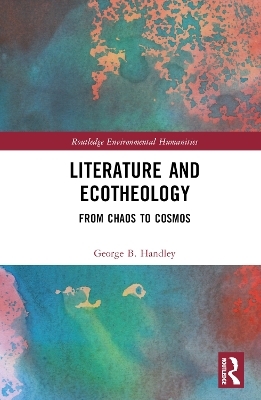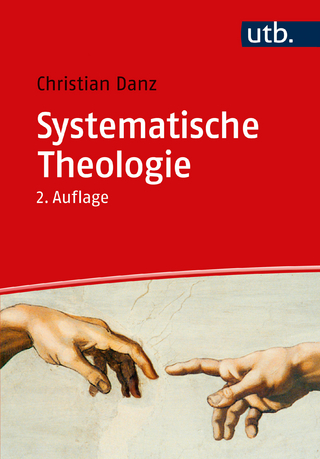
Literature and Ecotheology
From Chaos to Cosmos
Seiten
2024
Routledge (Verlag)
9781032769011 (ISBN)
Routledge (Verlag)
9781032769011 (ISBN)
This book challenges us in a time of climate crisis to find more common ground between the dual projects of ecocriticism and ecotheology. It will be of interest to students, scholars and researchers interested in ecotheology, religious studies, environmental literature, the environmental humanities, and environmental studies more broadly.
Literature and Ecotheology: From Chaos to Cosmos challenges us in a time of climate crisis to find more common ground between the dual projects of ecocriticism and ecotheology.
This book argues that in our postsecular age, literature has become an important repository of theological wisdom that can, like formal work in ecotheology, provide the moral grounds for environmental care. However, for any cosmological understanding to be adequate to the challenges before us, it must be responsive to the often-painful contingencies and uncertainties that inhere in the cosmos, something that both ecocriticism and ecotheology have often neglected. After a treatment of the ecocritical and ecotheological questions that pertain to the religious/secular divide, the study then turns to four contemporary American writers—Annie Dillard, Cormac McCarthy, Marilynne Robinson, and David James Duncan—as examples. Each uses the contingency of literary form and its promise of wholeness in order to imagine reasons for hope in light of the unpredictability and untold human and more-than-human suffering that lie at the heart of nature.
The book will be of interest to students, scholars and researchers interested in ecotheology, religious studies, environmental literature, the environmental humanities, and environmental studies more broadly. It offers a needed paradigm shift in how Western societies have tended to misuse both secularity and religion.
Literature and Ecotheology: From Chaos to Cosmos challenges us in a time of climate crisis to find more common ground between the dual projects of ecocriticism and ecotheology.
This book argues that in our postsecular age, literature has become an important repository of theological wisdom that can, like formal work in ecotheology, provide the moral grounds for environmental care. However, for any cosmological understanding to be adequate to the challenges before us, it must be responsive to the often-painful contingencies and uncertainties that inhere in the cosmos, something that both ecocriticism and ecotheology have often neglected. After a treatment of the ecocritical and ecotheological questions that pertain to the religious/secular divide, the study then turns to four contemporary American writers—Annie Dillard, Cormac McCarthy, Marilynne Robinson, and David James Duncan—as examples. Each uses the contingency of literary form and its promise of wholeness in order to imagine reasons for hope in light of the unpredictability and untold human and more-than-human suffering that lie at the heart of nature.
The book will be of interest to students, scholars and researchers interested in ecotheology, religious studies, environmental literature, the environmental humanities, and environmental studies more broadly. It offers a needed paradigm shift in how Western societies have tended to misuse both secularity and religion.
George B. Handley is a Professor of Comparative Literature and the Director of Global Environmental Studies at Brigham Young University, USA.
PART I: Why Ecocriticism Needs to Get Religion 1. Literature and Ecotheology 2. Literature as Ecotheology 3. Literature as Theodicy PART II: Literary Theodicy in Four Contemporary Examples 4. The Duality of Cosmos in Annie Dillard’s Pilgrim at Tinker Creek 5. The Tale as Cosmos in Cormac McCarthy’s The Crossing 6. Imagination as Cosmos in Marilynne Robinson’s Housekeeping 7. Syncretism as Cosmos in David James Duncan’s Sun House
| Erscheinungsdatum | 10.07.2024 |
|---|---|
| Reihe/Serie | Routledge Environmental Humanities |
| Verlagsort | London |
| Sprache | englisch |
| Maße | 156 x 234 mm |
| Gewicht | 620 g |
| Themenwelt | Religion / Theologie ► Christentum ► Kirchengeschichte |
| Naturwissenschaften ► Geowissenschaften ► Geologie | |
| Naturwissenschaften ► Physik / Astronomie ► Astronomie / Astrophysik | |
| Technik ► Umwelttechnik / Biotechnologie | |
| ISBN-13 | 9781032769011 / 9781032769011 |
| Zustand | Neuware |
| Informationen gemäß Produktsicherheitsverordnung (GPSR) | |
| Haben Sie eine Frage zum Produkt? |
Mehr entdecken
aus dem Bereich
aus dem Bereich
die Macht des Dunklen in unserer Zeit und wie wir ihr entgegentreten
Buch | Hardcover (2025)
Verlag Herder
CHF 27,90


